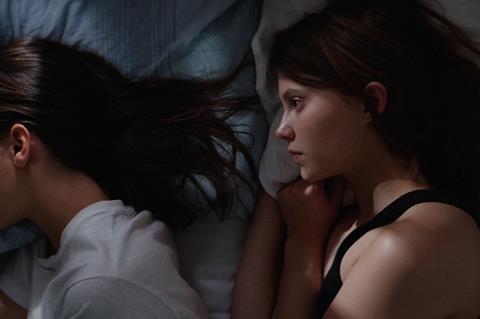Joachim Trier tries his hand at a supernatural thriller, with overt nods to De Palma and Stephen King

Dir. Joachim Trier. Norway/Sweden/France/Denmark. 2017. 116mins
A sheltered, sexually repressed young woman discovers she has startling telekinetic powers: the plot description of Thelma could just as easily apply to Carrie, and Joachim Trier’s new film knowingly echoes that fright-night classic, settling into its own odd rhythms while never quite escaping its predecessor’s mighty influence. Partly intriguing because it represents a conscious change of pace for the director of Reprise and Oslo, August 31st, this chilly existential horror movie judiciously spaces out its elegant shocks. And even if Trier doesn’t have much new to say about oppressive religious belief, childhood trauma or the terror of adolescent hormones, Thelma’s sustained, muted uneasiness gives this genre exercise sufficient gusto.
Thelma boasts an almost clinical tone, which gives the occasional fantastical moment a queasy strangeness
Thelma will be distributed in the US through the Orchard, which previously released Trier’s 2015 English-language debut Louder Than Bombs, and has sold widely through Memento on the strength of the director’s name, given it boasts scant star-power. Eili Harboe plays Thelma, who moves from the country (and her protective parents, played by Henrik Rafaelsen and Ellen Dorrit Petersen) to Oslo for university, only to find herself intimidated by the big city and her more outgoing, confident peers.
Befriending the beautiful Anja (Kaya Wilkins), Thelma quickly realises that her classmate has romantic feelings for her — a revelation that upsets this devout Christian. But a series of epileptic seizures soon take hold of Thelma, which seem inexplicably connected to a newfound ability to control nearby events with her mind.
Thelma boasts an almost clinical tone, which gives the occasional fantastical moment a queasy strangeness. Trier and regular cinematographer Jakob Ihre present a realistic world, emphasising the frigid landscape around the young woman’s rustic home and the sleek interiors of her school and the hospital where she is examined. Meanwhile, the director’s long-time composer Ola Fløttum only bolsters the creeping sense of anxiety, providing an ominous score that hints at terrors happening beneath the surface of the smooth images.
Because the screenplay so blatantly cribs from Carrie — everything from the meek heroine to the religious-fanatic family to the linking of supernatural powers with teenage sexuality — Trier seems to be toying with his audience, practically daring us to see the comparisons and then letting us wonder where he will deviate from the Brian De Palma film. Even Trier’s decision to dabble in low-key horror feels like a playful provocation — a way to upend expectations after making a series of straightforward character dramas.
There is, however, a ceiling on how engaging these gambits can be. Harboe capably portrays a young woman whose repression is at war with deep stirrings that threaten to tear her apart. But the fragile performance often seems in service to Trier’s meticulous approach, which intentionally leaves character motivations hazy. The strategy keeps us beguilingly off-balance — especially because we don’t know the full extent of Thelma and her parents’ difficult past, although some deft flashbacks will eventually flesh out their sad story. But while this opacity makes the characters feel distressingly unknowable, Thelma comes across as a tad impersonal, relying on horror tropes to do some of the emotional heavy lifting.
That said, Trier’s choice to keep the characters at a remove allows his ensemble to give poker-faced portrayals that resist easy empathy. Rafaelsen and Petersen are especially effective as parents we assume have stifled their child’s development for selfish, misguided reasons. Only as Thelma moves forward do we realise our mistake — although, appropriate to the filmmaker’s design, we remain teasingly uncertain all the way to the end.
Production companies: Motlys, Film Väst, Le Pacte, Snowglobe, Copenhagen Film Fund, Filmpool Nord, B-Reel, Don’t Look Now
US Distributor: The Orchard, www.theorchard.com
International sales: Memento Films International, sales@memento-films.com
Producer: Thomas Robsahm
Executive producers: Sigve Endresen, Eskil Vogt, Joachim Trier
Screenplay: Eskil Vogt & Joachim Trier
Cinematography: Jakob Ihre
Production design: Roger Rosenberg
Editor: Olivier Bugge Coutté
Music: Ola Fløttum
Main Cast: Eili Harboe, Kaya Wilkins, Henrik Rafaelsen, Ellen Dorrit Petersen
























![The Brightest SunScreen[Courtesy HKIFF]](https://d1nslcd7m2225b.cloudfront.net/Pictures/100x67/3/5/0/1448350_thebrightestsunscreencourtesyhkiff_312678.jpg)









